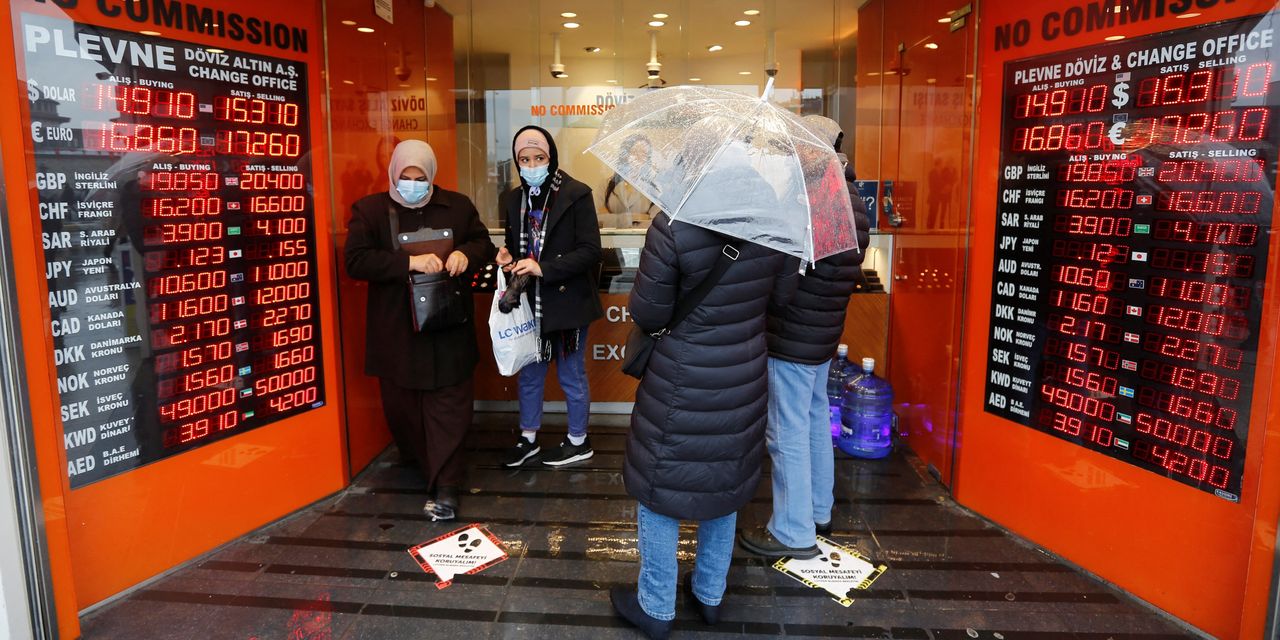
Istanbul’s stock market was twice forced to halt trading and the Turkish lira continued to fall Friday as concerns deepened that recent interest-rate cuts could cause an inflationary spiral.
Turkey’s benchmark Borsa Istanbul 100 index sank 8.5% Friday in its worst day since March, triggering two circuit breakers that halted trades. The lira lost as much as 8% of its value against the dollar, despite Turkey’s central bank intervening to arrest the decline in the country’s currency.
The crash followed another decision by the central bank on Thursday to cut interest rates under pressure from President Recep Tayyip Erdogan, who favors lower rates as a part of a vision to grow the Turkish economy. Mainstream economists have urged the government to raise interest rates to control Turkey’s rising inflation, which reached more than 21% last month, according to official statistics.
The lira’s continuing decline is increasingly squeezing ordinary Turks, who have seen their savings evaporate. It is also adding to pressure on the banking system, which has high levels of foreign-currency-denominated loans to repay within the next 12 months. As of September, the loans equaled about 11% of Turkey’s gross domestic product, according to Capital Economics.
“We are astonished to watch the central bank releasing its precious foreign exchange resources to the market today after it cut rates yesterday,” said Erdal Bahcivan, chairman of the board of the Istanbul Chamber of Industry, in a tweet.
Friday’s decision to intervene in the currency market was the fifth time that the central bank has stepped in to prop up the lira this month. It cited “unhealthy price formations in exchange rates,” in a statement declaring the intervention.
Economists estimate that Turkey’s central bank has more foreign-currency liabilities than assets, giving it little firepower to steady the lira through intervention. Despite the central bank selling assets Friday after the lira fell past 17 to the dollar, the currency began to slide again hours later.
“The diminishing impact of intervention is really telling,” said Paul McNamara, an emerging-market fund manager at GAM. “With this kind of intervention, the trouble is the market knows the level of reserves they have. It’s not like Russia or Brazil—countries that really have a lot of foreign currency they can throw at this.”
The lira has lost more than half its purchasing power against the dollar this year, much of that decline in the past month, a dramatic unraveling reminiscent of past emerging-market crises in places such as Argentina and Lebanon.
The plummeting lira makes it more likely that Turkey will need to implement capital controls—measures to restrict or even prohibit the flow of money out of the country—to keep the lira from being heavily sold, Mr. McNamara said.
Turkey’s ability to impose such controls is complicated by the country’s consistent need for foreign currencies as banks and companies need to repay or service debts. Investors see few other options for Turkey to stabilize the lira, expecting that Mr. Erdogan won’t want to raise interest rates. The Turkish president has fired a series of central bank governors and other senior officials who opposed his unorthodox view of the economy.
The loss of confidence in Turkey’s monetary policy has also put pressure on other parts of the market.
Turkish stocks had seen a strong run before Friday. Locals might have preferred to put their savings into stocks rather than other assets as inflation has risen, investors said, because companies can increase prices alongside inflation, boosting returns.
“Generally, a little bit of inflation is good for equities,” said Daniel Wood, a portfolio manager at William Blair Investment Management. “Once you get concerned about hyperinflation, that’s bad for companies.”
Shortly after Thursday’s rate raise, Mr. Erdogan also announced an increase in Turkey’s minimum wage, which could also stoke inflation, Mr. Wood said. Concerns over unbridled inflation might have prompted some investors to sell shares.
The cost of insuring against default on $10,000 of five-year Turkish dollar-denominated bonds using derivatives contracts called credit default swaps climbed to about $525 a year Friday, from about $380 a year at the end of June, according to FactSet. Investors buy these swaps if they think the price for insuring against a default will rise further.
“The upheaval in the markets and the level that foreign currencies reached worries many of our companies and affects them negatively,” said Rifat Hisarciklioglu, president of the Union of Chambers and Commodity Exchanges of Turkey.
Write to Caitlin Ostroff at [email protected] and Jared Malsin at [email protected]
Copyright ©2021 Dow Jones & Company, Inc. All Rights Reserved. 87990cbe856818d5eddac44c7b1cdeb8








